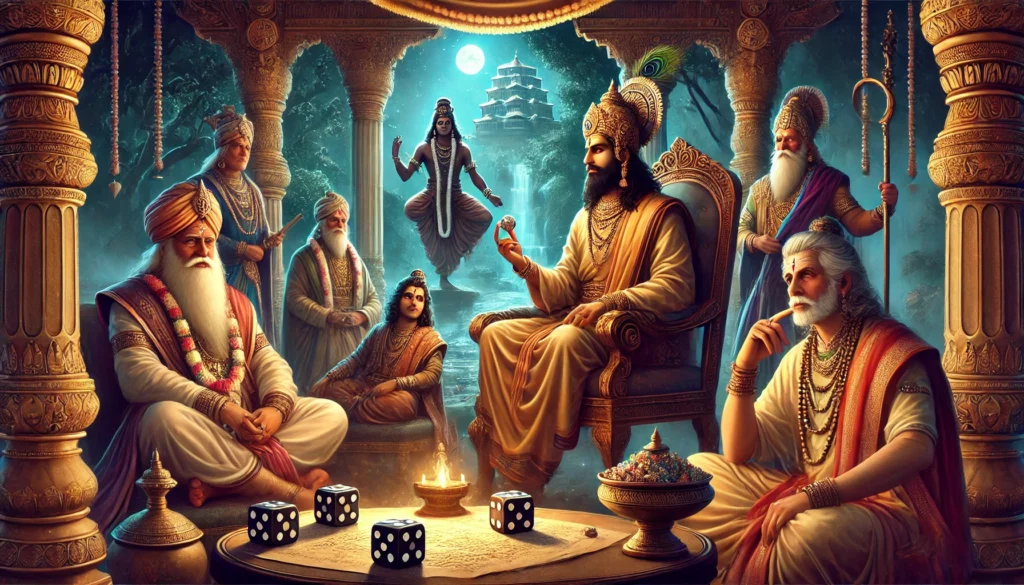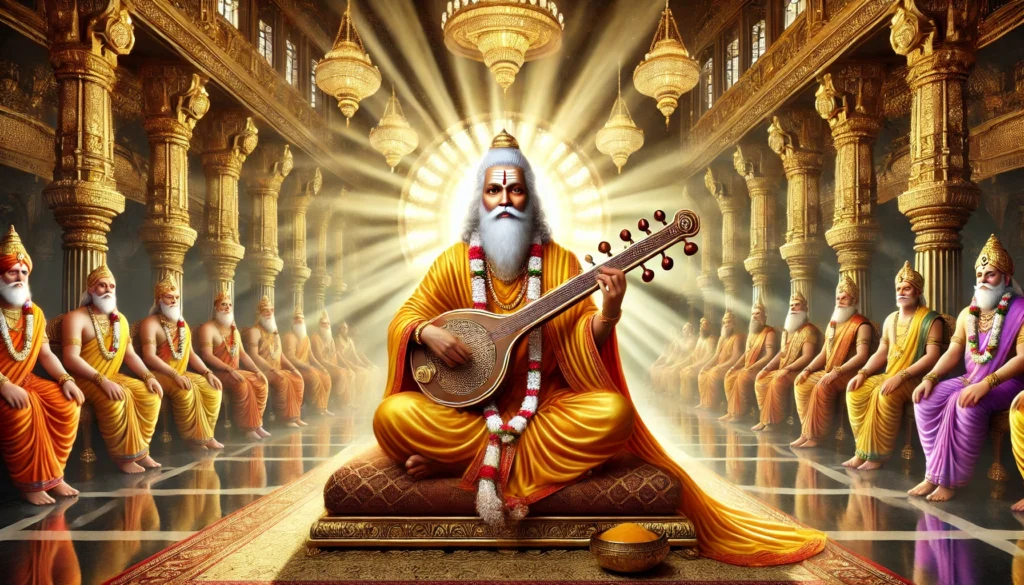The Mahabharata is often remembered for its epic battles, valorous warriors, and monumental clashes. However, behind the tumult of swords and arrows lies a fascinating dimension of wisdom, strategy, and intellect. Beyond the battlefield were minds that shaped destinies, paving the way for monumental events and imparting timeless teachings.
From the sage advisors to diplomatic masterminds, the lesser-known Mahabharata characters remind us that wisdom often outweighs brute strength. In this blog, we delve deep into the lives and legacies of the intellectual figures in Mahabharata, exploring their wisdom, strategy, and moral lessons.
Table of Contents
- Vidura: The Voice of Dharma and Wisdom
- Shakuni: The Misunderstood Mastermind
- Krishna: The Diplomatic Strategist
- Dronacharya: The Tactician Beyond Teaching
- Yudhishthira: The Rational King of Ethics
- Sage Narada: The Messenger of Truth and Insight
- Barbarik: The Analytical War Observer
- Conclusion
- FAQs

Vidura: The Voice of Dharma and Wisdom
Vidura, the half-brother of Dhritarashtra and Pandu, was the embodiment of righteousness and wisdom. Born to a maidservant through Sage Vyasa, Vidura’s intellect and foresight made him the trusted advisor in the Kuru court.
Vidura Neeti: A Treasure of Ethical Wisdom
Vidura’s teachings to Dhritarashtra, popularly known as Vidura Neeti, are profound lessons on governance, ethics, and morality.
Shloka from Vidura Neeti:
“धर्मेण हीनः पशुभिः समानः”
(A man devoid of dharma is no different from an animal.)
Vidura foresaw the impending doom caused by Duryodhana’s arrogance and often pleaded for peace. His ability to speak harsh truths with unwavering composure underlines his role as an intellectual figure who prioritized ethics over personal gain.
Moral Takeaway:
Integrity and ethical leadership are the hallmarks of a wise advisor. Vidura teaches us that dharma should be the foundation of governance.
Shakuni: The Misunderstood Mastermind
Shakuni is often vilified as the villain who orchestrated the infamous dice game. Yet, beneath his scheming exterior lay a brilliant strategist driven by personal motives.
The Motivation Behind Shakuni’s Actions
Shakuni’s hatred for the Kuru dynasty stemmed from his family’s suffering at the hands of Bhishma. His plotting was not borne of malice alone but of a deeply rooted desire for vengeance.
- Shakuni manipulated the dice game with calculated brilliance.
- His strategic genius lay in exploiting the weaknesses of the Kauravas and Pandavas alike.
Moral Takeaway:
Intelligence, when used for destructive purposes, leads to downfall. Shakuni reminds us that wisdom without morality becomes self-destructive.

Krishna: The Diplomatic Strategist
Lord Krishna, the master of diplomacy, emerges as the guiding light in Mahabharata. His role as Arjuna’s charioteer and peace envoy highlights his unparalleled intellect.
Krishna’s Efforts to Prevent War
Before the Kurukshetra war, Krishna made multiple attempts to broker peace between the Pandavas and Kauravas. His appeals to Dhritarashtra and Duryodhana were masterpieces of persuasion and logic.
Bhagavad Gita Reference:
“श्रेयान्स्वधर्मो विगुणः परधर्मात्स्वनुष्ठितात्”
(It is better to perform one’s own duty imperfectly than to master another’s duty.)
By sharing the Bhagavad Gita with Arjuna, Krishna imparted philosophical wisdom that transcends time. His teachings on duty, karma, and detachment showcase the depth of his intellectual acumen.
Moral Takeaway:
Diplomacy and wisdom can resolve conflicts where strength fails. Krishna exemplifies the power of strategic thinking and leadership
Dronacharya: The Tactician Beyond Teaching
Dronacharya, the guru of both the Pandavas and Kauravas, was a man of unmatched skill and intellect. His strategies on the battlefield were as legendary as his teaching.
The Creator of the Chakravyuha
The Chakravyuha, a complex spiral formation, was a testament to Dronacharya’s tactical brilliance. However, his inability to impart the entire strategy to Abhimanyu reflects the duality of knowledge—it can create and destroy.
Moral Takeaway:
Knowledge is a tool that must be used wisely. Dronacharya’s story reminds us of the responsibility that comes with teaching and leadership.

Yudhishthira: The Rational King of Ethics
Yudhishthira, the eldest Pandava, was not just a warrior but a king whose intellect shone brightest during crises.
The Yaksha Prashna
During their exile, Yudhishthira encountered a divine being (Yaksha) who posed a series of philosophical riddles. Yudhishthira’s answers, rooted in wisdom and morality, saved his brothers’ lives.
Example of Yaksha’s Riddle:
“What is the greatest virtue?”
Yudhishthira’s Answer: “Contentment is the greatest virtue.”
Moral Takeaway:
Rational thinking, patience, and ethical decision-making are the pillars of true wisdom. Yudhishthira’s intellect proved that mindful leadership prevails over impulsive actions.

Sage Narada: The Messenger of Truth and Insight
Sage Narada is often portrayed as a celestial sage who brings news and sparks events. However, his role in Mahabharata goes far beyond that of a mere messenger.
Narada’s Role in Shaping Events
Narada’s insights and warnings often served as wake-up calls for kings and warriors. His candid nature, though uncomfortable, prevented greater disasters.
- He advised Dhritarashtra about Duryodhana’s misdeeds.
- He imparted spiritual wisdom that often helped characters make ethical decisions.
Moral Takeaway:
The truth, no matter how harsh, is necessary for progress. Sage Narada teaches us that foresight and honesty are critical for preventing conflicts
Barbarik: The Analytical War Observer
Barbarik, the grandson of Bhima, was known for his extraordinary strength and intellect. His story offers a unique perspective on war strategy and its futility.
Barbarik’s Observations
Barbarik possessed the ability to end the war in minutes using his divine arrows. However, Krishna tested his wisdom and revealed a profound truth—the battle was not about victory but about dharma.
Barbarik’s analysis of the war demonstrated his ability to see beyond immediate outcomes, offering insights into the deeper consequences of warfare.
Moral Takeaway:
True intelligence lies in analyzing the bigger picture. Barbarik’s story is a reminder that wisdom involves understanding both action and its consequences.
Conclusion
The Mahabharata teaches us that the mind is mightier than the sword. Whether through Vidura’s ethical wisdom, Krishna’s diplomacy, or Yudhishthira’s rationality, these intellectual geniuses proved that true power lies in intellect and insight.
Their stories, interwoven with strategy, foresight, and morality, continue to offer timeless lessons. Wisdom, ethics, and strategic thinking are as relevant today as they were in the epic itself.
FAQs
1. Who was the wisest character in Mahabharata?
Vidura and Krishna are widely regarded as the wisest figures due to their ethical guidance and strategic acumen.
2. Why is Shakuni considered an intellectual genius?
Despite his villainous role, Shakuni’s strategic brilliance in orchestrating the dice game and manipulating events was unmatched.
3. What is the moral takeaway from Mahabharata’s intellectual heroes?
The Mahabharata teaches us that wisdom, ethics, and strategy often outweigh brute force in shaping outcomes.
4. What was Yudhishthira’s greatest act of wisdom?
Yudhishthira’s answers to the Yaksha Prashna reflect his rationality, patience, and deep understanding of life’s truths.
